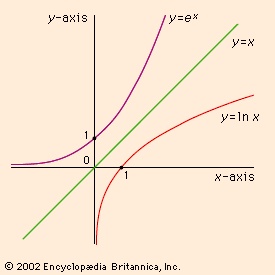exponential function
mathematics
 in mathematics, a relation of the form y=ax, with the independent variable x ranging over the entire real number line as the exponent of a positive number a. Probably the most important of the exponential functions is y=ex, sometimes written y=exp(x), in which e (2.7182818…) is the base of the natural system of logarithms (logarithm) (ln). By definition x is a logarithm, and there is thus a logarithmic function that is the inverse of the exponential function (see figure-->
in mathematics, a relation of the form y=ax, with the independent variable x ranging over the entire real number line as the exponent of a positive number a. Probably the most important of the exponential functions is y=ex, sometimes written y=exp(x), in which e (2.7182818…) is the base of the natural system of logarithms (logarithm) (ln). By definition x is a logarithm, and there is thus a logarithmic function that is the inverse of the exponential function (see figure--> ). Specifically, if y=ex, then x=ln y. The exponential function is also defined as the sum of the infinite series
). Specifically, if y=ex, then x=ln y. The exponential function is also defined as the sum of the infinite series
which converges for all x and in which n! is a product of the first n positive integers. Thus in particular, the constant

The exponential functions are examples of nonalgebraic, or transcendental, functions—i.e., functions that cannot be represented as the product, sum, and difference of variables raised to some nonnegative integer power. Other common transcendental functions are the logarithmic functions and the trigonometric functions. Exponential functions frequently arise and quantitatively describe a number of phenomena in physics, such as radioactive decay (analysis), in which the rate of change in a process or substance depends directly on its current value.
- minnow
- Minoan civilization
- Minobe Tatsukichi
- Mino da Fiesole
- Minogue, Kylie
- Minomura Rizaemon
- minor
- Minorca
- minority
- minority carrier injection
- Minoru Yamasaki
- Minor v. Happersett
- Minor, Virginia Louisa
- Minor White
- Minos
- Minot
- Minotaur
- Minot, George Richards
- Minot, Laurence
- Min River
- Minseitō
- Minsk
- Minsky, Marvin
- minstrel
- minstrel show